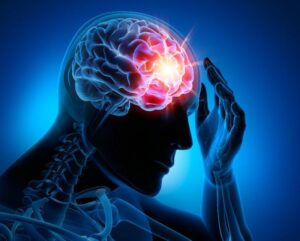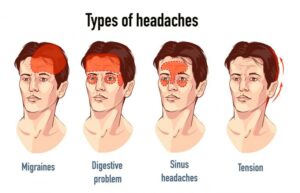Migraine Post Traumatic Stress Disorder, or migraine PTSD, is a relatively new diagnosis that is being given to people who suffer from debilitating migraines and also have symptoms of post-traumatic stress disorder. If you are one of the millions of people who suffer from chronic migraines, you may be wondering if you could also have migraine PTSD. In this blog post, we will discuss what migraine PTSD is, and how you can manage it if you are diagnosed with this condition.
Contents
What Does Migraine PTSD Mean?
 Migraine PTSD is a condition that can occur after someone has experienced a migraine attack. While the exact causes are unknown, it is thought to be related to the changes in brain chemistry that occur during a migraine. It is believed that these changes can lead to an increased sensitivity to stress, which can then trigger a type of post-traumatic stress disorder (PTSD).
Migraine PTSD is a condition that can occur after someone has experienced a migraine attack. While the exact causes are unknown, it is thought to be related to the changes in brain chemistry that occur during a migraine. It is believed that these changes can lead to an increased sensitivity to stress, which can then trigger a type of post-traumatic stress disorder (PTSD).
While it is not known how common this condition is, it is thought to be underdiagnosed due to the lack of awareness and understanding about it. Many people who experience migraine PTSD may not even realize that they have it, as they may just assume that their migraines are to blame for their increased stress and anxiety levels.
Therefore, if you have been experiencing migraines and have noticed that your stress levels have increased, it is important to speak to your doctor about this. They will be able to rule out any other potential causes and may refer you to a mental health professional for further assessment.
How Does It Look Like?
It is not uncommon for people with migraines to have anxiety, depression, or post-traumatic stress disorder (PTSD). In fact, research suggests that up to 30% of migraineurs also experience PTSD.
What is surprising is that many healthcare providers are not aware of the link between migraines and PTSD. This means that people with migraines are not always getting the care and support they need to manage both conditions.
Migraine PTSD can look different from person to person. For some, it may be triggered by a specific event or series of events that were particularly traumatic. Others may have more chronic PTSD that is not linked to a specific event but is instead a result of the ongoing stress and anxiety of living with migraines.
So, if you are living with migraines and also struggling with anxiety, depression, or PTSD, know that you are not alone. There is help available to manage both conditions.
What Are The Symptoms?
 There are a few different types of migraines, each with its own set of symptoms. But here are a few common symptoms of migraine PTSD, these include:
There are a few different types of migraines, each with its own set of symptoms. But here are a few common symptoms of migraine PTSD, these include:
- Intense and throbbing headaches
- Sensitivity to light and sound
- Nausea and vomiting
- Visual disturbances called an aura, which can include flashes of light or blind spots
- Tingling or numbness in the extremities
- Difficulty speaking
These symptoms can last for a few hours to a few days. And while they’re certainly debilitating, it’s the aftermath of a migraine that can be truly debilitating. It is often referred to as “migraine hangover” or “postdrome.” This is the phase where the migraine sufferer feels drained, exhausted, and confused. The symptoms of postdrome can last for up to 24 hours after the migraine has passed.
If you have migraines, you know that they can be more than just a headache. In fact, migraine is considered a neurological condition because it affects the brain. And while migraines are often treated with medication, there are other treatments that can help. So do not suffer in silence, talk to your doctor about your options.
Can PTSD Cause You Migraines?
This is a valid question because migraines and PTSD share certain symptoms, and both can be debilitating. It’s possible that the two conditions could interact or even aggravate each other.
PTSD, or post-traumatic stress disorder, is a condition that can develop after exposure to a traumatic event. And on the other hand, migraines are a type of headache that can be accompanied by a number of unpleasant symptoms.
The answer is Yes, PTSD can cause migraines, and vice versa. In fact, research suggests that there is a strong link between the two conditions.
A study of veterans found that those with PTSD were more likely to also have migraines. And in another study of civilians, researchers found that people with migraines were more likely to develop PTSD after a traumatic event.
So, if you have PTSD, there’s a good chance you also suffer from migraines. And if you have migraines, you may be at risk of developing PTSD. In fact, the connection between the two conditions is so strong that some experts have suggested that migraine should be considered a risk factor for PTSD.
The link between PTSD and migraines is believed to be due to the fact that both conditions share certain risk factors. For example, both are more common in women than men. And both are associated with a history of childhood trauma.
It’s important to remember that just because you have PTSD or migraines doesn’t mean you will develop the other condition. Hence, do not panic if you have one of these conditions. But it is important to be aware of the link between the two so that you can seek treatment if necessary.
What Could Be Other Causes Of Migraine?
 It is possible that there are other causes of migraine. For example:
It is possible that there are other causes of migraine. For example:
- Aside from stress and anxiety, dietary factors can also trigger migraines. Foods that contain nitrates, such as hot dogs and bacon, can increase the risk of migraine.
- Aspartame, which is a common artificial sweetener, has also been linked to migraines.
- MSG (monosodium glutamate), a common food additive, has also been linked to migraines. MSG is often added to Chinese food, processed meats, and some soups.
- Alcohol is another possible trigger for migraines. Red wine is especially likely to cause migraines in some people.
- Hormonal changes can also lead to migraines. Women are more likely to experience migraines during their menstrual cycle, pregnancy, and menopause.
- Certain medications can also trigger migraines. These include birth control pills, sleeping pills, and certain blood pressure medications.
These are a few other possible causes of migraines. If you think that stress and anxiety are triggering your migraines, there are some things that you can do to manage your condition. Just make sure not to self-medicate and to speak with a doctor before trying any new treatments.
How Is It Diagnosed?
It is often difficult to diagnose migraine PTSD because the symptoms can mimic other conditions. To be diagnosed with migraine PTSD, you must have all of the following:
- A history of migraines
- Post-traumatic stress disorder (PTSD) symptoms that start after a migraine episode
- Migraine symptoms that are aggravated by reminders of the event
Your doctor will ask about your medical history and symptoms. They may also do a physical exam and order tests, such as a brain scan or blood test. An accurate diagnosis can help you get the treatment you need.
Therefore, if you believe that you may have migraine PTSD, it is important to see your doctor. They can help you manage your symptoms and improve your quality of life.
How Is Migraine PTSD Treated?
 Now that you know a little more about migraine PTSD, you might be wondering how it’s treated. After all, if this condition can have such a profound and lasting impact on your life, surely there must be something that can be done to help.
Now that you know a little more about migraine PTSD, you might be wondering how it’s treated. After all, if this condition can have such a profound and lasting impact on your life, surely there must be something that can be done to help.
The good news is that there are treatments available for migraine PTSD. Some of these are listed below:
Medications
It is important to note that there are no specific medications approved by the FDA for the treatment of migraine PTSD. However, there are many effective treatments for migraines in general that can help to lessen the frequency and intensity of attacks. These include:
- Antidepressants
- Anti-anxiety medications
- Beta-blockers
- Calcium channel blockers
- Pain relievers
- Botulinum toxin injections
- Nerve blocks
These medications are believed to be effective in the treatment of migraine PTSD because they can help to reduce the frequency and intensity of migraines. In turn, this can help to reduce the stress and anxiety that are often associated with the condition.
Counseling
Another treatment option for migraine PTSD is counseling. This can be an effective way to help you deal with the emotional and psychological aspects of your condition. Counseling can also help you learn coping mechanisms to deal with triggers and manage symptoms. There are several types of counseling that can be effective for migraine PTSD, including:
- Cognitive behavioral therapy
- Psychotherapy
- Eye movement desensitization and reprocessing (EMDR)
If you are interested in pursuing counseling, talk to your doctor or a mental health professional to find a therapist who is experienced in treating migraines and PTSD.
Self-help tips
 Migraine PTSD is a condition that can develop after someone has experienced a traumatic event. Self-care is an essential part of managing this condition. Here are some self-help tips that may be helpful:
Migraine PTSD is a condition that can develop after someone has experienced a traumatic event. Self-care is an essential part of managing this condition. Here are some self-help tips that may be helpful:
- Identify your triggers: Keeping a migraine journal can help you to identify your triggers. Once you know what your triggers are, you can try to avoid them.
- Manage stress: Stress is often a trigger for migraines. Learning how to manage stress can help you to reduce the frequency and severity of your migraines.
- Get enough sleep: Sleep is important for overall health and can also help to reduce stress levels. Aim for 7-8 hours of sleep per night.
- Eat a healthy diet: Eating a healthy diet is important for overall health and can also help to reduce stress levels.
- Exercise: Exercise is a great way to reduce stress and improve overall health.
- Relaxation techniques: relaxation techniques such as yoga, meditation, and deep breathing can help to reduce stress levels and prevent migraines.
- Talk to someone: Talking to someone about your experiences can be helpful. If you don’t feel comfortable talking to friends or family, there are many counselors and therapists who specialize in trauma and PTSD.
- Keep a migraine diary: This can help you and your doctor track the frequency, intensity, and triggers of your migraines.
If you are struggling to manage your symptoms, it is important to seek professional help. A therapist who specializes in trauma and PTSD can help you to develop coping strategies and manage your symptoms.
Overall these can be helpful in managing migraine PTSD. However, it is important to remember that everyone experiences trauma and PTSD differently, so what works for one person may not work for another.
Conclusion
In a nutshell, migraine PTSD is a type of post-traumatic stress disorder that can occur after a person experiences a migraine attack. While the exact causes are unknown, it is thought to be related to the changes in brain chemistry that occur during a migraine.
If you think you may be suffering from this condition, it is important to seek professional help so that you can get the treatment you need. Do not suffer in silence. With the right treatment, you can manage your condition and live a full and happy life.
If you are struggling then please contact Therapy Mantra for help. The team of experts here will be more than happy to help you out and get you on the path to a better life. Contact us today to learn more about our services. You can also book an online therapy session or download our free Android or iOS app.


